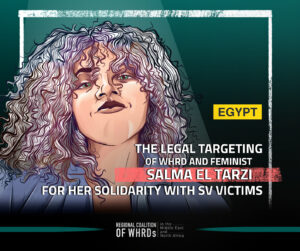
The Regional Coalition of Women Human Rights Defenders (WHRDs) in the Middle East and North Africa calls on feminist organizations to stand in solidarity with the Egyptian WHRD and feminist Salma El Tarzi, who is facing trial for her solidarity with victims and survivors of sexual violence, via a case filed against her by Egyptian film director Islam Azazi, who had 6 testimonies against him published on the “Daftar Hekayat” blog, that published numerous testimonies of survivors of sexual violence crimes committed by more than one perpetrator. Salma El Tarzi’s upcoming court session in case number 1573 for 2022 is scheduled for Sunday 11 September 2022. It is worth noting that she is the second activist to be tried for this reason, as a result of Azazi filing a case of defamation against her, where she is accused of slander, publishing posts on social media that violate the privacy (of the perpetrator) and intentional disturbance. Accordingly, she is liable to be tried according to Penal Codes No. 166 bis, 171, 302/1, 303/1, 306 and 308 bis, in addition to Communications Regulatory Law articles No. 70 and 76/2, and the Cyber Crimes Law article No. 25, which are punishable by imprisonment for 3 years and a fine one hundred thousand Egyptian Pounds. She is also liable to be fined a compensation amounting to one million Egyptian Pounds, as requested by Azazi.
Similar to Salma El Tarzi, writer, journalist and WHRD Rasha Azab faced trial for the same reason, where she was acquitted by the Egyptian Economic Court on 23 April 2022, and indicted by the Appeals Court on 21 August 2022, fining her for ten thousand Egyptian Pounds, a verdict that was flabbergasting and outrageous, to say the least, and sets a precedent in legally punishing WHRDs and feminists for their solidarity with victims and survivors of sexual violence. While the feminist movement, whether globally, regionally or locally long called for numerous decades to hold perpetrators of crimes of sexual violence accountable, today, after numerous feminist movement waves of exposing perpetrators and validating anonymous testimonies, a tool historically used by feminists and survivors to be heard and criminalize atrocious crimes perpetrated against them, they are shamed and smeared for their solidarity and excercise of their basic right to physical integrity. These cases explicitly show an alarming pattern that can be adopted by perpetrators of sexual violence to silence their victims/survivors and clampdown on all feminist voices of dissent against these crimes, a pattern which is not threatening to certain feminists or victims only, but to the gains achieved by feminist movements globally.
It is imperative that all feminist voices and movements from various regions stand in solidarity with Salma El Tarzi, and send a clear message to all perpetrators that their crimes will never be tolerated. It is also important to validate the loud voices of anonymous victims and survivors, recognize their defiance, and affirm that anonymous testimonies are not weak or condemned to dereliction, but are valid legal evidence on which such heinous crimes can be investigated; as was the case with previous sexual violence cases in Egypt, such as that known as the infamous ABZ case, in which Ahmed Bassam Zaki was indicted and sentenced to multiple counts of imprisonment for sexual harassment, assault and rape. Salma El Tarzi should be recognized for her solidarity and courage in standing up against a serial perpetrator of sexually violent crimes in accordance to testimonies published against him, and not be subject to the flagrant tool of “patriarchal disciplining” against feminists, victims/survivors and women worldwide.
About Salma El Tarzi :
She is an Egyptian Filmmaker, artist and essayist, who was born in Cairo in 1978. She demonstrates, through her work across various mediums, her interest in questions of representation, power, love, and violence. Salma is a recipient of the Muhr Award from the Dubai Film Festival in 2013, for the Best Documentary Director category, for her feature length documentary entitled: Underground/On the Surface. She also authored a non-fiction graphic novel entitled: Attempt to Remember My Face, which reflects on loss, love, womanhood and motherhood, by revisiting her relationship with her late mother and two grandmothers, published in 2020. In addition, she co-authored Three Women of Tahrir, a non-fiction graphic novel on the weaponization of sexual violence against female protestors during the Egyptian revolution. She also published a testimony in 2020 on her own rape incident, reflecting on current feminist discourses and the power dynamics involved in the process, which stirred much debate.
Salma El Tarzi is currently working on an ongoing art research since 2018 on the representation of desire in Mainstream Egyptian Cinema, and the normalization of rape culture, the first iteration of which was an art installation in Tashweesh Feminist Art Festival, a lecture performance, a written text and a short video essay for Jeem Platform. The final iteration is a book to be published in 2023.
Additional links to a couple of her published articles:

